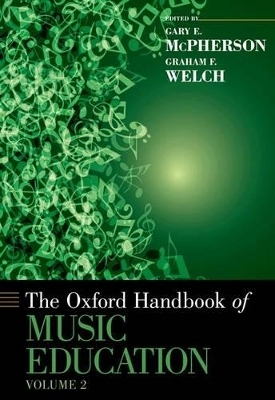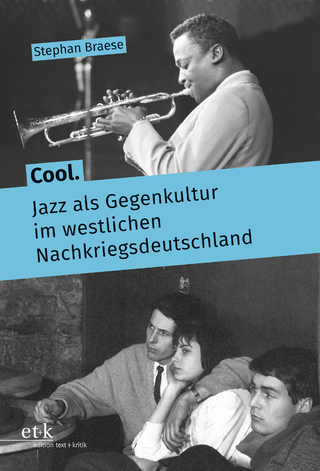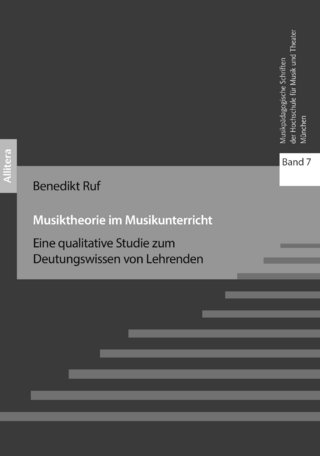
The Oxford Handbook of Music Education, Volume 2
Oxford University Press Inc (Verlag)
978-0-19-992801-9 (ISBN)
Gary E. McPherson is Ormond Chair and Director of the Melbourne Conservatorium of Music, University of Melbourne. He is editor of The Science and Psychology of Music Performance (OUP, 2002, with Richard Parncutt) and The Child as Musician: A Handbook of Musical Development (2006). A past President of ISME he has published well over 100 publications across a range of music education and music psychology topics. Graham Welch is Chair of Music Education at the Institute of Education, University of London. He is elected Chair of the internationally based Society for Education, Music and Psychology Research (SEMPRE) and Immediate Past President of the International Society for Music Education (ISME). His publications number over three hundred and embrace musical development and music education, teacher education, the psychology of music, singing and voice science and music in special education and disability.
Handbook Preface ; Acknowledgments ; External referees ; Section 1: Special Abilities, Special Needs ; Section Editor: Adam Ockelford ; Chapter 1: Commentary: Special abilities, special needs ; Adam Ockelford ; Chapter 2: Mapping musical development in learners with the most complex needs: The Sounds of Intent project ; Adam Ockelford and Graham Welch ; Chapter 3: Exceptional musical abilities: Musical prodigies ; Gary E. McPherson and Andreas C. Lehmann ; Chapter 4: A fresh look at music therapy in Special Education ; Katrina McFerran and Cochavit Elefant ; Chapter 5: Inclusive music classrooms and programs ; Judith A. Jellison ; Chapter 6: Preparing for the future: Music students with Special Education needs in school and community life ; Alice-Ann Darrow and Mary S. Adamek ; Section 2: Music in the Community ; Section Editor: David Elliott ; Chapter 7: Commentary: Music in the community ; David J. Elliott ; Chapter 8: The community within community music ; Lee Higgins ; Chapter 9: Community music and social capital ; Patrick M. Jones and Thomas W. Langston ; Chapter 10: Community music therapy ; Kenneth Aigen ; Chapter 11: Community music and social justice: Reclaiming love ; Marissa Silverman ; Chapter 12: Sonic hospitality: Migration, community and music ; Helen Phelan ; Chapter 13: At-risk youth: Music-making as a means to promote positive relationships ; Mary L. Cohen, Laya Silber , Andrea Sangiorgio and Valentina Iadeluca ; Chapter 14: Fast forward: Emerging trends in community music ; Kari K. Veblen and Janice L. Waldron ; Section 3: Adult Learning Within A Lifespan Context ; Section Editors: David E. Myers and Chelcy L. Bowles ; Chapter 15: Commentary: Adult learning within a lifespan context ; David E. Myers ; Chapter 16: Elders and music: Empowering learning, valuing life experience, and considering the needs of aging adult learners ; William M. Dabback and David S. Smith ; Chapter 17: Adult music learning in formal, nonformal, and informal contexts ; Kari K. Veblen ; Chapter 18: Music teacher education: Crossing generational borders ; Jody L. Kerchner and Carlos R. Abril ; Chapter 19: The role of higher education in fostering musically engaged adults ; Chelcy L. Bowles and Janet L. Jensen ; Chapter 20: Lifelong learning for professional musicians ; Rineke Smilde ; Chapter 21: An international perspective on music education for adults ; John Drummond ; Section 4: Musical Creativity as Practice ; Section Editor: Pam Burnard ; Chapter 22: Commentary: Musical creativity as practice ; Pamela Burnard ; Chapter 23: Empathy and creativity in group musical practices: Towards a concept of empathic creativity ; Ian Cross, Felicity Laurence, Tal-Chen Rabinowitch ; Chapter 24: Intercultural tensions and creativity in music ; Eva Saether with Alagi Mbye and Reza Shayesteh ; Chapter 25: Communal creativity as socio-musical practice ; Eleni Lapidaki, Rokus de Groot and Petros Stagkos ; Chapter 26 Assessing creativity in music: International perspectives and practices ; Samuel Leong, Pamela Burnard, Neryl Jeanneret, Bo Wah Leung, Carole Waugh ; Chapter 27: Creativity in partnership practices ; Bernadette D. Colley, Randi Margrethe Eidsaa, Ailbhe Kenny and Bo Wah Leung ; Section 5: Music Learning and Teaching Through Technology ; Section Editor: Evangelos Himonides ; Chapter 28: Commentary: Music learning and teaching through technology ; Evangelos Himonides ; Chapter 29: The misunderstanding of music-technology-education: A meta perspective ; Evangelos Himonides ; Chapter 30: Technology and the educator ; Ross Purves ; Chapter 31: The student prince: Music-making with technology ; Andrew King ; Chapter 32: Driving forward technology's imprint on music education ; Jonathan Savage ; Section 6: Media, Music and Education ; Section Editor: Matthew Thibeault ; Chapter 33: Commentary: Media, music and education ; Matthew D. Thibeault ; Chapter 34: Music education in the postperformance world ; Matthew D. Thibeault ; Chapter 35: Let's Play! Learning music through video games and virtual worlds ; Evan S. Tobias ; Chapter 36: Collaborative digital media performance with generative music systems ; Andrew R. Brown and Steven C. Dillon ; Chapter 37: Music learning and new media in virtual and online environments ; S. Alex Ruthmann and David G. Hebert ; Section 7: Critical Reflections and Future Action ; Section Editor: Gary McPherson and Graham Welch ; Chapter 38: Commentary: Critical reflections and future action ; Gary E. McPherson and Graham F. Welch ; Chapter 39: Politics, policy and music education ; Hal Abeles ; Chapter 40: Instrumental teachers and their students: Who's in the driving seat? ; Nick Beach ; Chapter 41: University professors and the entrepreneurial spirit ; Liora Bresler ; Chapter 42: Pride and professionalism in music education ; Richard Colwell ; Chapter 43: Pondering the grand experiment in public music education ; Robert A. Cutietta ; Chapter 44: Music education and some of its sub-fields: Thoughts about future priorities ; Lucy Green ; Chapter 45: Music education - An unanswered question ; Wilfried Gruhn ; Chapter 46: Improving primary teaching - Minding the gap ; Sarah Hennessy ; Chapter 47: International music education: Setting up a global information system ; Liane Hentschke ; Chapter 48: The responsibility of research in defining the profession of music education ; Christopher M. Johnson ; Chapter 49: Constructing communities of scholarship in music education ; Estelle R. Jorgensen ; Chapter 50: Internationalising music education ; Andreas C. Lehmann ; Chapter 51: Emotion in music education ; Richard Letts ; Chapter 52: Music education from a slightly outside perspective ; Hakan Lundstrom ; Chapter 53: Research issues in personal music identification ; Cliff Madsen ; Chapter 54: Preparation, perseverance, and performance in music: Views from a program of educational psychology research ; Andrew J. Martin ; Chapter 55: Music therapy in schools: An expansion of traditional practice ; Katrina McFerran ; Chapter 56: Embracing new digital technologies - Now and into the future ; Bradley Merrick ; Chapter 57: Challenges for research and practices of music education ; Bengt Olsson ; Chapter 58: All theoried up and nowhere to go ; Bennett Reimer ; Chapter 59: Make research, not war: Methodologies and music education research ; Wendy L. Sims ; Chapter 60: The preparation of music teacher educators: A critical link ; David J. Teachout ; Chapter 61: Music and the arts: As ubiquitous and fundamental as the air we breathe ; Rena Upitis ; Chapter 62: There is nothing complex about a correlation coefficient ; Peter R. Webster ; Chapter 63: Dewey's bastards: Music, meaning, and politics ; Paul Woodford
| Reihe/Serie | Oxford Handbooks |
|---|---|
| Verlagsort | New York |
| Sprache | englisch |
| Maße | 175 x 249 mm |
| Gewicht | 1315 g |
| Themenwelt | Kunst / Musik / Theater ► Musik ► Musiktheorie / Musiklehre |
| Sozialwissenschaften ► Pädagogik | |
| ISBN-10 | 0-19-992801-0 / 0199928010 |
| ISBN-13 | 978-0-19-992801-9 / 9780199928019 |
| Zustand | Neuware |
| Haben Sie eine Frage zum Produkt? |
aus dem Bereich


